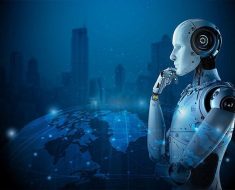As technology progresses at breakneck speeds, we’re on the precipice of a new era in artificial intelligence (AI)—the advent of Artificial General Intelligence (AGI). Unlike current AI systems, which excel at specific tasks or functions, AGI promises to replicate the cognitive abilities of humans, potentially handling any task we can.
The term AGI was notably spotlighted by Tesla CEO Elon Musk, suggesting that its emergence could begin as soon as 2025. This level of AI would not only be able to learn new tasks but could autonomously navigate complex and unforeseen challenges, much like a human would. Imagine teaching an AGI-equipped driving assistant how to operate a vehicle—you’d only need to guide it once before it took the wheel with competence.
While these advancements may suggest a paradigm shift in how we live and work, they also present significant societal implications. Employment, in particular, may see drastic changes as machines rise to shoulder responsibilities historically reserved for human workers. The conversation around the displacement of jobs by robots is no longer speculative—it’s quickly becoming our reality.
As businesses and governments increasingly pivot towards ‘smart factories’, where AI fuses with information and communication technologies for manufacturing, we must consider the shift from human-operated to AI-operated production systems. This integration of AGI into everyday life signifies a narrowing of the human domain, as the machines we create begin to satisfy consumer demands, manage quality control, and dictate the direction of our economies.
In essence, AGI is not a distant science fiction dream but a tangible reality. As it promises to bring joy to CEOs through unparalleled efficiency and increased production quality, it simultaneously hints at the contraction of human roles. The time has come for us to ponder the radical impact that AI and AGI might unleash upon our world, redefining the human experience as we know it.
Current Market Trends:
The AGI market, while still in its nascent stages, is driven by spectacular advancements in machine learning, deep learning, and neural networks. Companies such as DeepMind, OpenAI, and others are investing heavily in the research and development of technologies that edge closer to AGI capabilities. The rise of cloud computing and the exponential increase in data availability are fueling these advancements, providing the computational power and training data necessary for sophisticated AI models.
One current trend is the integration of narrow or weak AI across various industries. As businesses adopt these AI systems, there is a growing demand for more versatile and adaptive AI, hinting towards a market that would be ready to embrace AGI should it become available. The automotive, healthcare, and financial sectors are among the forefront in adopting AI technologies, potentially paving the way for AGI applications.
Forecasts:
While predictions vary, experts anticipate that AGI could be developed by the end of this century, with some, like Elon Musk, estimating it could emerge as early as 2025. As computational power continues to grow and algorithms become more sophisticated, the timeline for AGI realization might be shorter than originally expected.
Key Challenges and Controversies:
The implications of AGI are vast and not without controversy. One pressing challenge is the ethical framework within which AGI operates. Ensuring that AGI systems align with human values and ethics is a significant concern. Furthermore, issues of privacy, security, and the potential for misuse by maligned actors present formidable challenges.
Another major challenge is economic disruption. AGI could significantly displace the workforce, leading to increased unemployment and widening inequality. The question of how to integrate AGI into society in a manner that benefits all remains unanswered.
Advantages:
The advantages of AGI are numerous. AGI could handle complex problem-solving tasks, accelerate scientific research, and provide solutions to pressing global issues such as climate change and health crises. AGI can assist in scenarios requiring high-level cognitive functions such as decision making, reasoning, and language understanding.
Disadvantages:
Conversely, there are disadvantages to consider. The risk of job displacement is high, and there is potential for societal upheaval. Another disadvantage is the ‘control problem’: the difficulty in ensuring that AGI systems remain under human control and do not act against humanity’s best interests.
Most Important Questions:
– How can we ensure the ethical development and deployment of AGI?
– What policies should be instituted to prepare for the potential economic impacts of AGI?
– How do we address the control problem and ensure that AGI remains beneficial and safe?
– What are the implications of AGI for privacy and data security?
– How might AGI transform industries, and what new industries could it create?
For those interested in exploring more about Artificial General Intelligence and current discussions and developments on this topic, relevant and trustworthy sources include:
– DeepMind
– OpenAI
– Tesla, particularly for Elon Musk’s comments on AGI
It is important to verify the URLs provided for their accuracy and relevance to the subject matter. The links given lead to the main pages of prominent organizations active in the field of AI and AGI, but be sure to conduct your research using the latest and most reliable sources.


![Testing learning-enabled cyber-physical systems with Large-Language Models: A Formal Approach. (arXiv:2311.07377v2 [cs.SE] UPDATED)](https://aigumbo.com/wp-content/themes/sociallyviral/images/nothumb-sociallyviral_related.png)